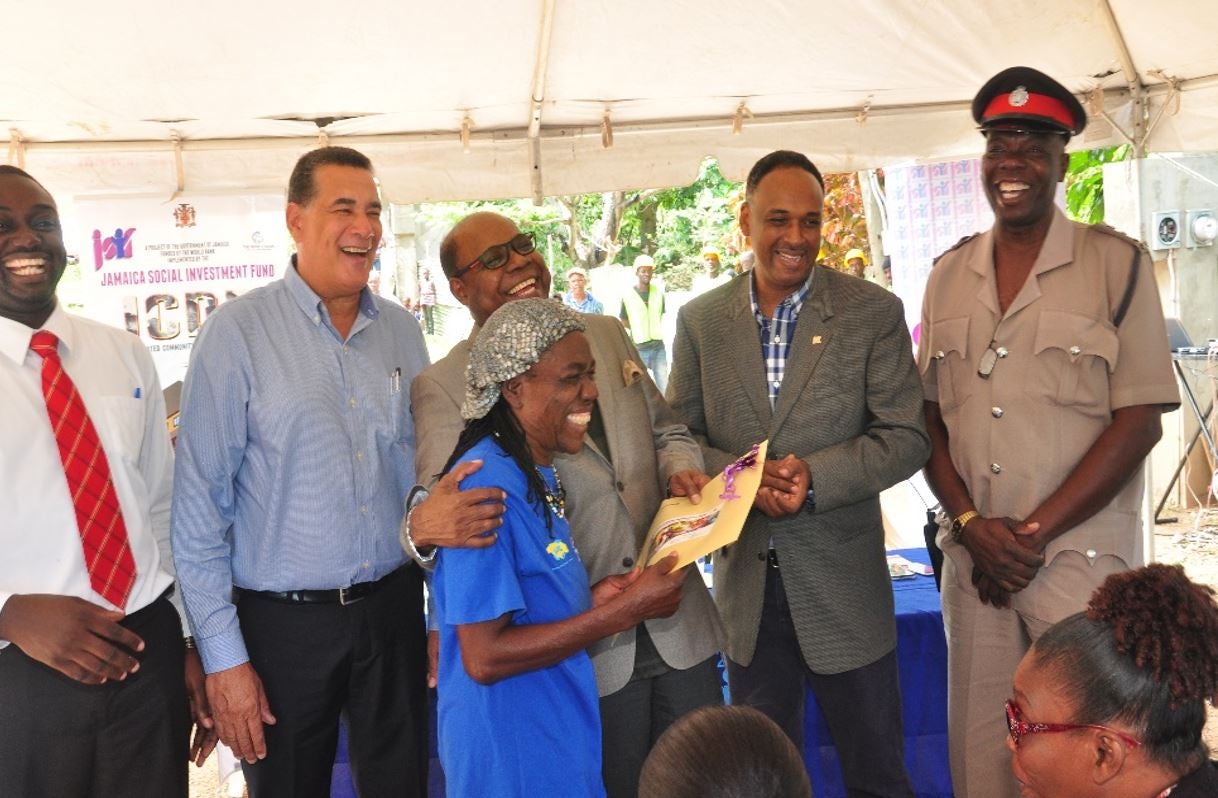
Esmilda Woolery receiving her first birth certificate - Photo: Jamaica Social Investment Fund
Sixty five years old Esmilda Woolery clutched her birth certificate tightly to her chest and beamed with pride at the camera. The resident of Barrett Town, an inner- city community in St. James, Jamaica was holding for the first time, a birth certificate that formally establishes her identity due to the Operation Certification, a civil registration initiative in Jamaica.
Operation Certification a social services project under the Integrated Community Development Project (ICDP),is being implemented by the Jamaica Social Investment Fund (JSIF) through a US$42 million loan by the Government of Jamaica from the World Bank. The aim of the ICDP is to broaden access to basic infrastructure services including road networks, water and sewage system, solid waste management services as well as a menu of social services including the provision of birth certificates to the most vulnerable in communities.
In Jamaica, a birth certificate is a base document for many other types of identification including a passport and a national identification card. It is also a requirement for accessing a range of social services in Jamaica including health, education and social welfare services provided by the Government of Jamaica.
Access to social welfare services in Jamaica
The United Nations Development Programme (UNDP) annual report on Jamaica for 2016, estimates the poverty rate among the country's 2.8 million people at 14.5 per cent or 406,000 of citizens living in either near or in extreme poverty. The report ranks Jamaica at 94 out of 188 countries on the UNDP human development index, which assesses health, education and standard of living.
Access to quality services especially for the most vulnerable is important to reversing poverty. In keeping with the World Health Organization philosophy of health as a fundamental right of every citizen, the Government of Jamaica (GOJ) is keen on providing universal access to quality care at the primary level, while investments are made to improve the infrastructure and service delivery at the secondary and tertiary levels.
Subsidies for prescription medication is an important tool utilized by the Ministry of Health under the National Health Fund to make prescriptions more affordable to the poor hence reducing the financial barriers to treatment. Access to social welfare services including conditional cash transfers and a range of grants to support economic activities, living accommodation, funeral expenses, health expenses, education and disaster recovery is critical to the most vulnerable in Jamaica including: children, persons with disabilities (PwDs), elderly, unemployed and victims of disasters. In the financial year 2017/2018 a total of 5,183 persons benefitted from grants of which 63.2% were females.
The challenge remains to expand these services to other underserved households who lack birth certificates and formal identification and therefore unable to access these services. Social inclusion of the most vulnerable residents in communities served by the ICDP is the main thrust of the Operation certification programme.
How does Operation Certification work?
Operation Certification is being implemented in partnership with the Registrar General’s Department which is the only organisation in Jamaica with responsibility for registering the vital events of births, fetal deaths, marriages and deaths.
Community fairs are used as the main vehicle for the registration of individuals. These public events are advertised utilizing various communication channels including motorized town criers, community notice boards, community meetings, school meetings and social media. Additionally, flyers and mini postcards resembling a party invitation were distributed at strategic popular locations popular such as bars, community shops and wholesale outlets, bus & taxi stands.
The registration process is also supported by the recruitment, selection and training of 40 data collectors. These data collector are residents of communities targeted by the ICDP and benefit from short term employment and training under the programme in all aspects of the application process. The use of data collectors in the programme is a deliberate strategy to ensure service delivery to vulnerable individuals who are unable to attend the community fairs due to a range of issues including disability, child care responsibilities and mobility issues.
The project also includes the use of distribution points within communities - such as community centres - to facilitate ongoing registration of residents and the distribution of birth certificates. The cost of transportation is a common barrier to access the nine offices approved by the Government of Jamaica to distribute birth certificates island-wide. To ensure greater efficiency in the collection and processing of applications, staff from the Registrar’s General Department also participate in the registration fairs.
The benefit of a birth certificate extends beyond identity; it is a valuable tool in supporting social inclusion for the most vulnerable citizens and the gateway for them to access their rights as citizens.
See also: New model for development: Tackling urban vulnerability and public safety


Join the Conversation